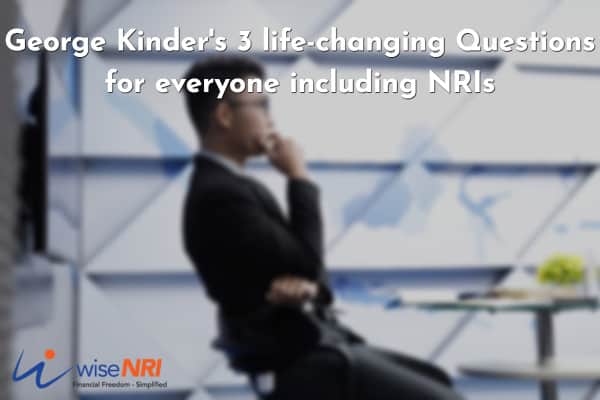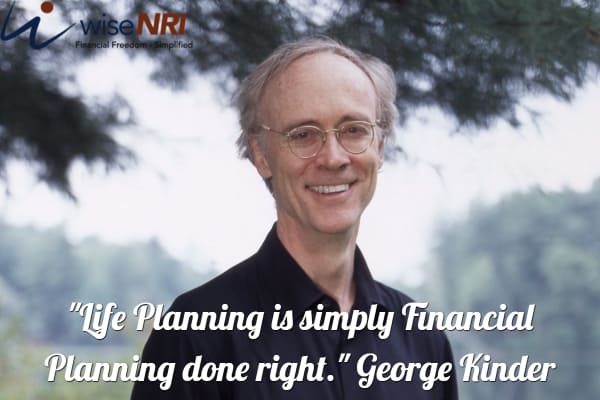Our sense of general well-being and our financial security are strongly interlaced. After all, money affects practically every aspect of our ability to function in life.
But it can be challenging to strike a good balance between financial goals and life as it unfolds. To be truly independent, you need an adequate financial cushion to live a content, comfortable and fulfilling life, while doing what you enjoy the most.
At the extreme end of the spectrum is someone who is overly preoccupied with acquiring a fortune to last generations! Such a person may find it difficult to have enough time to do what truly excites them. Such a life is not well-lived and such people usually end up with feelings of despair and discontent.

The Kinder Way
George Kinder – a Harvard Economist, philosopher, and Certified Public Accountant – created a framework to help us come up with simple, effective, and actionable solutions to these problems. Due to his extensive work as a tax practitioner and financial advisor and later enjoining them with Buddhist teachings, Kinder is regarded as the ‘father of life planning.’
George Kinder defined life Planning as “[Life planning] hinges on our individual responses to profound and provocative questions challenging us to look at how close we are living to what would be most meaningful, passionate and exciting for us.”
Simply put, Kinder puts stress to focus on the “personal and emotional” side of personal financial planning. With the help of strategies he developed, one can discover their “deepest and most profound” objectives and goals. This is achieved by following a mindful, structured, and non-judgmental inquiry with the help of your financial advisor.
The advisor then can use professional tools and relationship skills to help their clients. These involve discussion for resolving obstacles, creating an actionable financial plan, providing continued guidance, and helping clients across important milestones.
Financial advisors can really help their clients in the pursuit of their true aspirations.
Check – Money Lessons from the Movie Soul
Kinder’s Three Questions for NRIs
The “Three Questions” framework is the first step in the direction to design your life with a greater purpose. This framework can aid you in prioritizing the most important goals and what makes you the happiest.
NOTE: Transform your financial life with George Kinder’s 3-question strategy. But don’t just read, write down answers with pen and paper. Start with question 1, then move to 2, in just 10 minutes.
Question 1: Design Your Life
Imagine you are financially secure, that you have enough money to take care of your needs, now and in the future. How would you live your life? Would you change anything? Let yourself go. Don’t hold back on your dreams. Describe a life that is complete and richly yours.
The first question will help you find out what is important to you in life by helping you visualize your major life goals.
We have all fantasized about what we would do when we have an X amount of money, and that X is very large! As the first step, the financial planner will help you visualize the same but with more structure: they will help you identify specific needs and the money required to meet them today and going forward.
Once you have these numbers in place it will become easier to visualize how you would live your life. What would you change from the present and replace it with what? They would encourage you not to hold back your imagination and to describe a content, happy, and purposeful life. A life that makes you feel complete.
Your response would help you discover a thorough, sincere, and most likely intriguing answer to the mystery question – “what are my ambitions in life?”
It seems to be simple, but when done with prudence and honesty this question can help you be more reflective and surface an innate desire with deep thinking.
Must Read – Financial Planning for NRIs – How it’s different & complex
Question 2: You Have Less Time
Now imagine that you visit your doctor, who tells you that you have only 5-10 years to live. You won’t ever feel sick, but you will have no notice of the moment of your death. What will you do in the time you have remaining? Will you change your life and how will you do it? (considering your current financial & personal situaltion)
As the second question, Kinder asks you to imagine that you have a limited time in this life, say 5 to 10 years from now. It is not sure when, but it is definite! You will not fall sick or feel tired or old – it is just that you have at max, say Y years left and without any notice, you’ll be no more.
This is exactly the opposite of having infinite resources, and all other things being the same answering the second question becomes more challenging.
The response to this question will help you draw your personal “bucket list“ and prioritize the thing before you say goodbye. Imagining a life with a sell-by-date will help you get the priorities straight. You will focus more on things that matter the most, leaving aside those that don’t.
This question will help you live here and now. Neither should you put off the most important things nor wait too long to enjoy the fruits of your labour – it might be too late.
This question also serves as the stepping-stone for question three.
Question 3: Today’s THE Day
Finally, imagine that your doctor shocks you with the news that you only have 24 hours to live. Notice what feelings arise as you confront your very real mortality. Ask yourself:
-
What did you miss?
-
Who did you not get to be?
-
What did you not get to do?
What would you do today, and do it differently, if you were to know that your life was ending even sooner? In the next 24 hours!
The sudden surge of multiple emotions is what most people would feel – when they come face to face with their own demise. The mortality of life becomes starker and in-your-face when we attend a funeral of a closed one – that too not too old.
With these emotions in play, ask yourself: What opportunities did you miss? You could not be someone, who was that? You were meant to achieve something, what could you not do?
Most people would answer this question not in terms of money, physical assets, job role, or power.
They would rather have a healthy body & mind, they would regret not spending more time with their family, playing with kids, and having fun with friends.
Their deepest regrets would be not travelling more, not sharing their love for nature, and not having the time to follow their passion.
Many people would regret they could bring the change they imagined or contribute more to society. Some people would regret not leaving a legacy for their community and family and bringing smiles to others.
In short, not being able to have and leave great and joyful memories.

Check – Benifits of Financial Planning for NRIs
How Can NRIs Leverage Kinder’s Three Questions?
Having considered all three questions in a more structured and systematic manner, it will become clear to you your ambitions, desires, goals, and passions. It puts a spotlight on the actions you must take to make the most out of your life – and help you clear the clutter in your thinking.
At the end of this exercise, the advisor will help you visualize one more life scenario – one where you have both time and money to follow your dreams. And they work with you to come up with an actionable life plan to set a course toward this goal.
It helps you think not only about distant goals such as retirement but even the faintest and amorphous goals like being able to contribute to your relationships and the larger community.
Remember, that while finances, budgeting, and financial freedom are important, many other people and things would have a greater impact on our lives.
By using Kinder’s Three Questions NRIs can also start designing their lives consciously. You can put into action a life plan, bringing about a shift in habits, behaviours, and routines for a more rich life experience.
Spending more time on your true passions, with family, and having fun with friends would do the trick.
Create the life you want to lead and act today to begin living it now!
Share your thoughts in the comments after answering George Kinder’s questions. Was this exercise helpful for you?
I will suggest you do this 3-question exercise with your spouse – you may come to know about their dreams.
